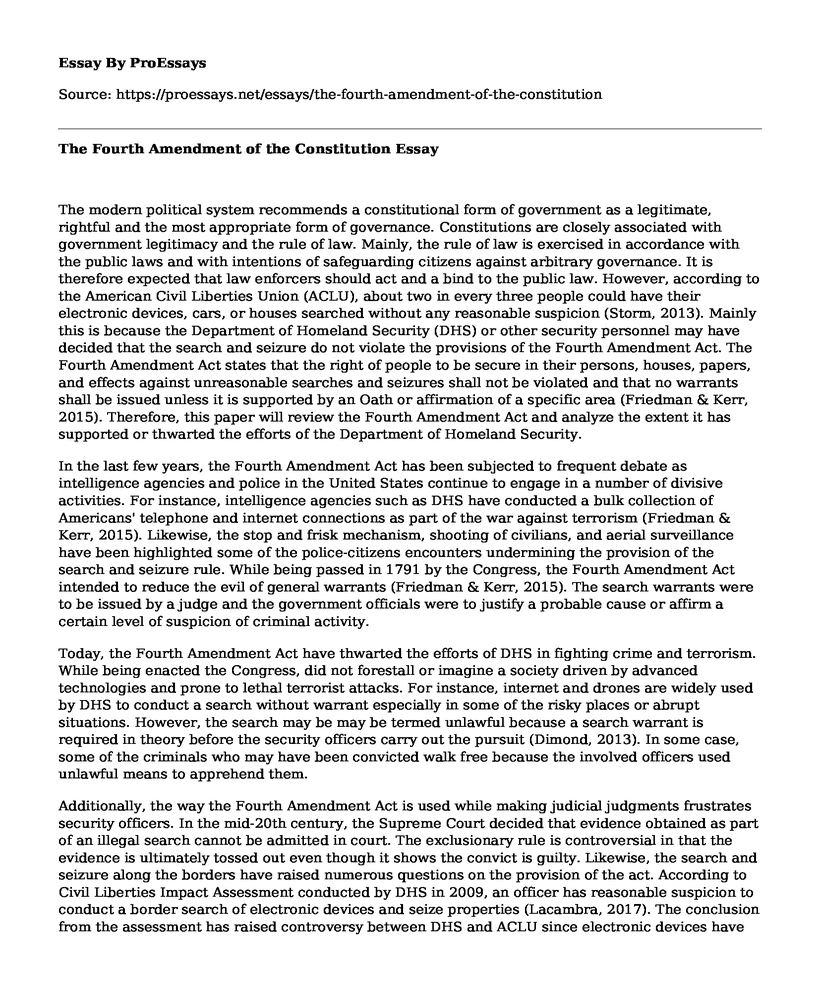The modern political system recommends a constitutional form of government as a legitimate, rightful and the most appropriate form of governance. Constitutions are closely associated with government legitimacy and the rule of law. Mainly, the rule of law is exercised in accordance with the public laws and with intentions of safeguarding citizens against arbitrary governance. It is therefore expected that law enforcers should act and a bind to the public law. However, according to the American Civil Liberties Union (ACLU), about two in every three people could have their electronic devices, cars, or houses searched without any reasonable suspicion (Storm, 2013). Mainly this is because the Department of Homeland Security (DHS) or other security personnel may have decided that the search and seizure do not violate the provisions of the Fourth Amendment Act. The Fourth Amendment Act states that the right of people to be secure in their persons, houses, papers, and effects against unreasonable searches and seizures shall not be violated and that no warrants shall be issued unless it is supported by an Oath or affirmation of a specific area (Friedman & Kerr, 2015). Therefore, this paper will review the Fourth Amendment Act and analyze the extent it has supported or thwarted the efforts of the Department of Homeland Security.
In the last few years, the Fourth Amendment Act has been subjected to frequent debate as intelligence agencies and police in the United States continue to engage in a number of divisive activities. For instance, intelligence agencies such as DHS have conducted a bulk collection of Americans' telephone and internet connections as part of the war against terrorism (Friedman & Kerr, 2015). Likewise, the stop and frisk mechanism, shooting of civilians, and aerial surveillance have been highlighted some of the police-citizens encounters undermining the provision of the search and seizure rule. While being passed in 1791 by the Congress, the Fourth Amendment Act intended to reduce the evil of general warrants (Friedman & Kerr, 2015). The search warrants were to be issued by a judge and the government officials were to justify a probable cause or affirm a certain level of suspicion of criminal activity.
Today, the Fourth Amendment Act have thwarted the efforts of DHS in fighting crime and terrorism. While being enacted the Congress, did not forestall or imagine a society driven by advanced technologies and prone to lethal terrorist attacks. For instance, internet and drones are widely used by DHS to conduct a search without warrant especially in some of the risky places or abrupt situations. However, the search may be may be termed unlawful because a search warrant is required in theory before the security officers carry out the pursuit (Dimond, 2013). In some case, some of the criminals who may have been convicted walk free because the involved officers used unlawful means to apprehend them.
Additionally, the way the Fourth Amendment Act is used while making judicial judgments frustrates security officers. In the mid-20th century, the Supreme Court decided that evidence obtained as part of an illegal search cannot be admitted in court. The exclusionary rule is controversial in that the evidence is ultimately tossed out even though it shows the convict is guilty. Likewise, the search and seizure along the borders have raised numerous questions on the provision of the act. According to Civil Liberties Impact Assessment conducted by DHS in 2009, an officer has reasonable suspicion to conduct a border search of electronic devices and seize properties (Lacambra, 2017). The conclusion from the assessment has raised controversy between DHS and ACLU since electronic devices have become part of the personal life of a person and hold bulk information some of which may be personal.
In conclusion, the DHS efforts to combat terrorism and criminal activities have been threatened by the provision and civil rights campaigns on the Fourth Amendment Act. Although people should be protected against unreasonable search and seizure, officers should act promptly to any situation that may be suspicious. The main issue with the act is that it does not provide a clear guideline to exceptional circumstances where security agencies should act without a warrant. Therefore, even when a situation may be justified the officers have to take responsibility for their decisions and some of the obtained evidence tossed out in courts.
References
Dimond, D. (2013). Homeland Security vs. Your Civil Rights. Retrieved fromhttps://www.creators.com/read/diane-dimond/10/13/homeland-security-vs-your-civil-rights
Friedman, B., & Kerr, O. (2015). The Fourth Amendment of the U.S. Constitution. Retrievedfrom https://constitutioncenter.org/interactive-constitution/amendments/amendment-iv
Lacambra, S. (2017). The Bill of Rights at the Border: Fourth Amendment Limits on SearchingYour Data and Devices. Retrieved from https://www.eff.org/deeplinks/2017/04/bill-rights-border-fourth-amendment-limits-searching-your-data-and-devices
Storm, D. (2013). 2 out of every 3 Americans lost Fourth Amendment protections to DHS.Retrieved from https://www.computerworld.com/article/2474541/data-privacy/2-out-of-every-3-Americans-lost-fourth-amendment-protections-to-dhs.html
Cite this page
The Fourth Amendment of the Constitution. (2022, Oct 10). Retrieved from https://proessays.net/essays/the-fourth-amendment-of-the-constitution
If you are the original author of this essay and no longer wish to have it published on the ProEssays website, please click below to request its removal:
- Case Study on Acceptance and Commitment Therapy
- Essay Sample on Internet Addiction as a Medical Condition
- Paper Example on Jon Benet Murder: Open Windows, Broken Basement Window Offer Easy Access
- Paper Example on Leadership Traits: My Potential From Childhood
- Essay on Perceptual Awareness & Attention: Examining the Relationship
- The Need for Freedom: Locke and Others Contribute to Declaration of Independence - Essay Sample
- Navigating Subcultures: A Comparison of Prisonization and Religious Conversion - Free Essay







